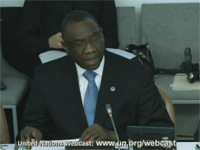DESA News
Volume 15, No.5 - May 2011
Feature articles

2011 has been described as a critical year for the environment. This is the time when the world has to get ready for the 2012 UN Conference on Sustainable Development (Rio+20) in Brazil. At the UN, preparations are well under way and on 2-13 May crucial issues for a greener and healthier planet will be addressed.
There are many pressing issues facing the world today and there is a need to resolve them, and to do it fast. Starting on 2 May, the 19th Session of the Commission on Sustainable Development (CSD-19) will take place in New York to tackle some of the critical challenges at hand.
The Chair of CSD-19 and the Minister of Environment and Forests of Romania, László Borbély, states the following in his message prior to the meeting: “The next 10 years are critical for sustainable development. Recent crises created a new sense of urgency. In our globalized world, the impacts of local crises that occur in one geographic area have effects at regional or global scale. The themes of the current CSD cycle provide an opportunity to initiate coordinated and coherent action on several increasingly challenging dimensions.”
The topics on the agenda for the Commission to act on this year include transport, chemicals, waste management, mining and the ten year framework of programmes on sustainable consumption and production.
Call for leaded gasoline phase-out and mass transit schemes
Current trends within transportation development are not sustainable and the need to reduce pollution levels and cut emissions has been widely recognized. If the global community does not act on these issues, it may result in environmental and health problems. Transportation is also expected to be a major force behind a growing world demand for energy. Urgent action is therefore needed to promote integrated transport plans and to accelerate the phase-out of leaded gasoline. The international community also needs to forge partnerships to strengthen infrastructure and to support the use of non-motorized transport. Moreover, there is a call for innovative mass transit schemes and the effective use of public transportation. At previous CSD sessions, countries have stressed the importance of efficient and affordable transport systems for poverty alleviation and the need to mitigate harmful externalities to health and the environment.
Need for safe handling of chemicals and waste
Within some of the world’s most important industrial areas, there has been gross chemical contamination, gravely affecting people’s health and genetic structures as well as the environment. The use of chemicals is essential to meet the social and economic goals of the world community, and these can be used with a high degree of safety when best practices are followed. However, much remains to be done. Two of the major problems are the lack of sufficient scientific information for risk assessment and shortage of resources for evaluation of chemicals for which data are available.
Another potential threat is hazardous waste. Effective control through the whole process – from its generation to its disposal – is very important. To prevent the creation of hazardous wastes and to rehabilitate contaminated sites are also key elements, requiring knowledge, financial resources and technical and scientific capacities. CSD will also discuss solid waste, which includes domestic refuse and non-hazardous waste.
Three priority areas for mining
The main constraints to sustainability in the mining sector stems from the ever-increasing demand for mined resources, the consumption of resources to extract and process metals and the increasing pollution generated. Given its importance to revenue and employment in some developing countries, the sustainability of this industry remains crucial.
To improve sustainability, three priority areas have been identified: Address the environmental, economic, health and social impacts and benefits of mining throughout their life cycle, including workers’ health and safety; Enhance the participation of stakeholders, including local and indigenous communities and women; Foster sustainable mining practices through the provision of financial, technical and capacity-building support to developing countries and countries with economies.
Shifting to green consumption and production
Transitioning to more sustainable patterns of consumption and production is also crucial. DESA’s Division for Sustainable Development has been a co-leader to implement and contribute to a 10-year framework of programmes on sustainable consumption and production, also referred to as the Marrakesh Process. The 10-year plan will now be presented before CSD.
The Commission has many important issues to address and the result of its work will feed into next year’s important conference Rio+20, taking place on 4-6 June in Brazil. Although many challenges remain to be solved to make our planet greener and healthier, efforts undertaken around the world ignite hope.
CSD-19 Chair László Borbély also states: “We should not forget that the core of sustainable development is human development and progress. By improving the quality of life, by using natural resources in a sustainable manner and by promoting a healthy environment, we will succeed in preserving the Earth’s life-support systems for present and future generations.”
For more information:
19th Session of the Commission on Sustainable Development:
http://www.un.org/esa/dsd/csd/csd_csd19.shtml
The 2012 UN Conference on Sustainable Development (Rio+20):
http://www.uncsd2012.org/rio20/
To stay updated on topics and events leading up to Rio+20, subscribe to Rio+20: Making it Happen

Today, there are over 370 million indigenous people in about 90 countries worldwide. They have unique cultures and ways of relating to other people and the environment with social, cultural, economic and political characteristics that are distinct from the dominant societies in which they live. Despite cultural differences, the various indigenous peoples around the world share common problems related to the protection of their rights as distinct peoples.
Indigenous peoples look to the international community to promote, protect and respect their ways of life and their right to traditional lands, territories and natural resources. However, these rights continue to be violated. Indigenous peoples are among the most disadvantaged and vulnerable populations today. The international community has recognized this and is working to protect their rights.
The Permanent Forum on Indigenous Issues
The Permanent Forum on Indigenous Issues is one of three UN bodies mandated to deal specifically with indigenous peoples’ issues. The Forum acts as an advisory body to the Economic and Social Council to discuss indigenous issues related to economic and social development, culture, the environment, education, health and human rights.
The first session of the Forum was held in May 2002 and it continues to meet annually for two weeks each year. According to its mandate, the goal of the Forum is to: provide expert advice and recommendations on indigenous issues to the Council; raise awareness and promote the integration and coordination of activities related to indigenous issues within the UN system; and prepare and disseminate information on indigenous issues.
The Forum will meet this month for the tenth session to review recommendations and implementation made at previous sessions. Since the last session, fourteen new members have joined the Forum, while only two have served previously. Hundreds of participants are expected to attend the event to discuss topics related to Economic and Social Development, the Environment and Free, Prior and Informed Consent.
Recommendations and Implementation
At the first nine sessions, the Forum made hundreds of recommendations to the UN System and Member States as well as to indigenous organizations. Roughly half of the Forum’s proposals have been acted upon. During this time, the UN Declaration on the Rights of Indigenous Peoples was adopted while the UN Development Group issued Guidelines on Indigenous Peoples Issues. The international community has made some progress and become increasingly involved in recognizing the rights of indigenous peoples. However, these rights are not always implemented. This gap between recognition and realization has been called the implementation gap and will be one of the key points emphasized by the Permanent Forum.
Water
Water is a human right and a necessity to sustain life. In recent years, there has been a stronger and growing demand for access to safe drinking water and sanitation to be considered as a human right. In 2010, the General Assembly adopted a resolution that called upon States and international organizations to provide financial resources, build capacity and transfer technology to improve efforts to provide safe, clean accessible and affordable drinking water and sanitation for all.
At the tenth session, the Permanent Forum will devote a half day discussion on the right to water and indigenous peoples. This discussion is expected to highlight some of the issues that indigenous peoples currently face as well as bring forward input into current UN processes involving water rights.
A regional focus on Latin America and the Caribbean
Each year the Permanent Forum devotes a half day discussion to a specific region. This year, the Forum will discuss indigenous peoples’ issues in the Latin America and Caribbean region. This will include the participation of indigenous peoples from the region in an active engagement of the UN system. Some of the issues that are expected to arise include constitutional reforms, intercultural and plurinational states, the criminalization of protest and the cocoa leaf.
In July 2010, the Forum conducted a mission trip to Colombia, at the invitation of the Colombian government, to observe the situation and threats to indigenous people. The Forum looked specifically at victims of abuse related to the armed conflict and in danger of extinction and the Awá people. Many of the Awá people are displaced and facing many hostilities, while others are at risk of losing their land due to a lack of education. At the conclusion of this visit, the Forum made about 60 recommendations to the Government as well as the UN system.
Looking to the Future
The General Assembly has decided to organize a World Conference on Indigenous Peoples in 2014 on the realization of the rights of indigenous peoples, including pursuing the objectives of the UN Declaration on the Rights of Indigenous Peoples. The Permanent Forum will play a key role in determining the modalities of the World Conference.
For more information: http://www.un.org/esa/socdev/unpfii/

“The unique capacity of civil society to forge grand coalitions that transcends borders, running from the grassroots to the international level needs to be put to the service of the development cause of LDCs”, stated Ambassador Cheick Sidi Diarra, Secretary-General of the Fourth UN Conference on the Least Developed Countries (UN LDC IV) at an Interactive Civil Society Hearing on 1 April.
The General Assembly hearing was held in preparation for UN LDC IV, taking place on 9-13 May in Istanbul. Discussions focused on the results of the 10-year action plan adopted in 2001 and on how to further strengthen new measures for sustainable development of LDCs.
Full coverage: http://www.unmultimedia.org/tv/webcast/2011/04/general-assembly-interactive-civil-society-hearings-in-preparation-for-un-ldc-iv-english.html
Event: http://www.un.org/wcm/content/site/ldc/home/template/events_item.jsp?cid=25213
Fourth UN Conference on the Least Developed Countries: http://www.un.org/wcm/content/site/ldc/home



